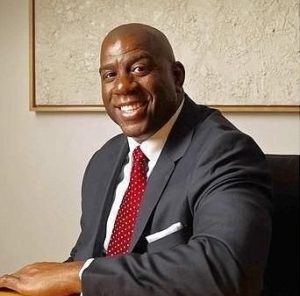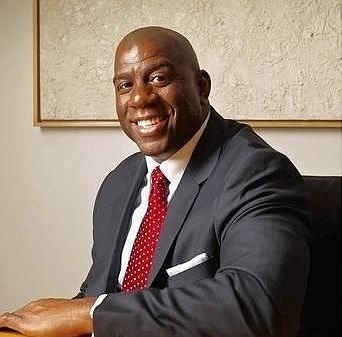 EO’s mission is to help entrepreneurs achieve their full potential. One way EO facilitates that is through programmes such as the EO Powerhouse Series, designed to give exclusive access to thought leaders and changemakers across various industries.
EO’s mission is to help entrepreneurs achieve their full potential. One way EO facilitates that is through programmes such as the EO Powerhouse Series, designed to give exclusive access to thought leaders and changemakers across various industries.
In May, EO Seattle member and Global Learning Committee Chair David Nilssen moderated a virtual interview with Earvin “Magic” Johnson, an American National Basketball Association (NBA) legend, entrepreneur, philanthropist and motivational speaker. EO members heard first-hand about Magic’s challenges and the journey to propel his company to the status of No. 1 urban brand in America. Johnson has developed the skills and tenacity to excel as an athlete, business leader and changemaker.
Today, he is chairman and CEO of Magic Johnson Enterprises, which provides high-quality products and services that focus primarily on ethnically diverse and underserved urban communities through strategic alliances, investments, consulting and endorsements.
The EO Powerhouse Series interview with Magic Johnson is available exclusively to EO members until 26 August 2021.
In case you missed it, here are 7 “Magic learning moments” that this inspiring entrepreneur shared during the interview:
- You’re going to have to work for it. As a teenager, Magic asked his father for money to go to the movies. With 10 kids to raise, there wasn’t money for movies. So, his father said, “I can’t give you money, but I can do something better—follow me to the garage,” and he introduced Magic to “Mr. Lawnmower, Mr. Rake and Mr. Shovel,” saying, “They can help you earn money to go to the movies.” Magic credits his father for teaching him the value of working for what he wanted and setting an unwavering example: Magic’s father was never late, nor ever missed a day of work, for General Motors in 30 years. And also ran a trash hauling service on the weekends as a second job!
- Leaders must know how to get the best from their teams. The Los Angeles Lakers coach, Pat Riley, understood that talent won championships—but that his talent had to be ready to play. “A lot of teams think they can coast in practice and then turn it on in games, but it doesn’t work that way,” Magic shared. “When game time came, we played hard, naturally—because we practiced hard.”
- The best coaches are motivational geniuses. Riley motivated Magic to perform at his highest level by loudly discussing with an assistant coach how Magic’s rivals, Larry Bird and Michael Jordan, had performed in their latest games. Riley would say, “Did you see what Larry Bird did? He scored 40 points, got 15 rebounds and made 8 assists!” and, “Did you hear that Jordan scored 51 points tonight?” Magic knew he would be compared with the other two, and his extremely competitive nature made him want to play his best in the game. Magic credits Riley for making him a better player.
- Your competitors can make you better. Of rivals Bird and Jordan, Magic said, “I learned so much from both of them. Larry Bird made me a better basketball player and a better man.” But it’s not only in the sports arena that competitors benefit us. “Your competitors can make you better as a small business owner. You can learn from them, just as they can learn from you.”
- Great business owners make their employees better. “The two greatest basketball players I played against—Michael Jordan and Larry Bird—what did they do? They made their teammates better,” Magic said. He extrapolates that lesson to entrepreneurship: “For all of us who own their own business, what is our goal? To make every employee who works for and with us better. Help them grow to achieve their goals and dreams. When you do that, guess what? They’ll run through a wall for you. They’ll come in early and work late. They’ll be the biggest brand ambassadors you have. Happy employees and satisfied customers are strong brand ambassadors.”
- What the CEO is passionate about will trickle down to everyone else. If it’s in your DNA to have a family or team environment at your company, or to be a hard worker, or to overdeliver—then that’s going to trickle down to everybody else in your company. Magic gets up at 4:30am, works out for two hours, and is in the office every single day. His employees have to bring their A-game. “I only want to work with people who get the job done. It might take us until 8pm to get it done. I want people who have that same type of mindset.” To motivate those who don’t, Magic might say, “Hey, one day you’re going to be a manager or executive in this company, so I want to help you make that dream a reality, but these are the things you have to do to reach that level.” It’s all about accountability!
- When people say you can’t do something, it’s the greatest feeling to prove them wrong! Magic went to a high school that wasn’t known for basketball. In his freshman year, the team was ranked last place in the district. “I was only 15 years old, but I knew we were NOT coming in last place,” Magic recalled. Everybody was shocked that the team went 8-0 (8 wins, no losses). Then they played one of the top basketball schools in Michigan and blew them away—Magic scored 36 points, with 16 rebounds and 16 assists—his first so-called “triple-double” at age 15. The team went on to compete in the state championships that year. A local sportswriter nicknamed him “Magic” for that season’s accomplishments—and it stuck!
Stay tuned for our next blog post featuring Part II of this interview, where Magic discusses six additional lessons he’s learned throughout his entrepreneurial journey!
And, get ready for upcoming installments of EO Powerhouse Series—including Jay Shetty on 13 July 2021, Trevor Noah on 31 August 2021 and Jane Goodall on 23 September 2021. EO members can register here to enjoy this exclusive, free speakers series.
Categories: Best Practices Coaching Entrepreneurial Journey Inspirational Interview LEADERSHIP Lessons Learned

